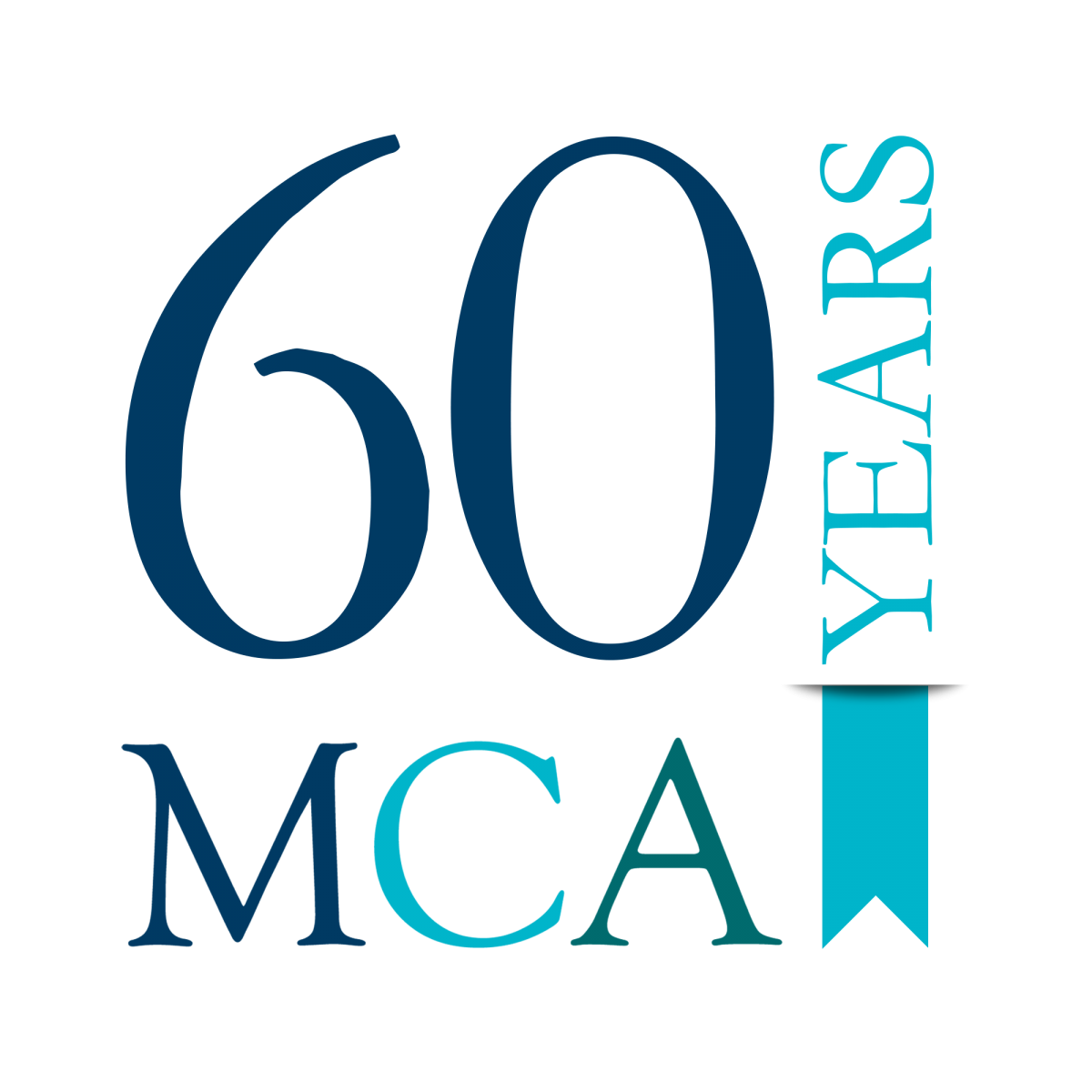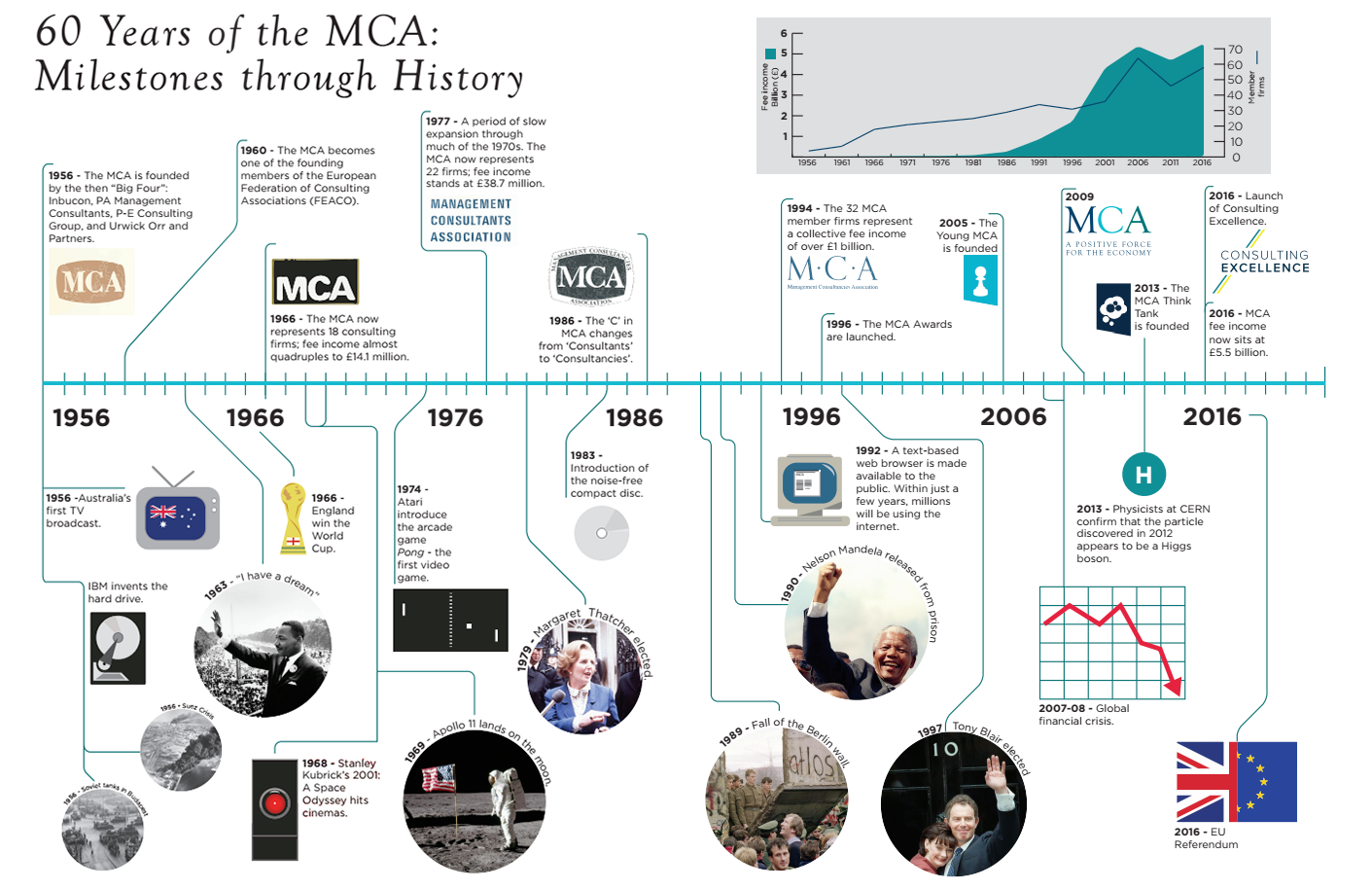A week is a long time in politics. 60 years is an eternity in business. As the MCA embarks on its seventh decade at the heart of consulting, it is exhilarating to reflect on changes since the Association was founded in 1956, the year of Suez, Jim Laker’s 19 wickets in a Test Match, Soviet tanks in Budapest, Elvis’s first charts entry, IBM’s invention of the hard drive, the inaugural Eurovision Song Contest, Australia’s first TV broadcasts, and Rocky Marciano’s unbeaten retirement.
Management consulting is a young industry. The first consultancies appeared towards the end of the 19th Century. They provided independent strategic advice and technical analysis. But consulting really got going in the 1940s and 50s, especially in the US. Robert McNamara, for example, who was later John F Kennedy’s Secretary of Defense, applied his skills as a Price Waterhouse accountant analysing Allied bomber logistics in the Second World War. He then deployed similar techniques at Ford, improving production efficiency and vehicle safety, by examining accident and complaint data, and applying conclusions to the manufacturing process.
By the 50s, consulting also had a sufficiently developed presence and identity in the UK to launch a trade association. But the industry remained small. Four firms with combined income of £4m founded the MCA. Over the next ten years, Annual Reports show how the Association and consulting grew, through strategic advice and work on efficiency and ‘overhead reduction’, for a corporatist Britain in decline, hoping the ‘White Heat’ of technological revolution would change its fortunes. The MCA doubled in size by the time Martin Luther King had his dream, and nearly doubled again as Geof Hurst scored his hat-trick against West Germany.
Through the economically challenging 1970s, the Association slowly expanded. Annual Reports at this time reflect on the ‘unreliability’ and ‘uncompetitiveness’ of British exports. We can imagine member firms contributing knowledgeably to debates about the UK’s poor productivity, industrial relations and status as ‘the sick man of Europe’. Then our industry took off in the 1980s. MCA firms were at the heart of the UK’s post-industrial reinvention. Consulting became more intellectually systematic. Disciplines such as Lean, Six Sigma, and Total Quality Management emerged. Consultants helped tackle industrial over-manning. They provided pioneering support in the newly opened-up public sector. And they were integral to new and innovative service industries in design, media, telecoms and finance. By the fall of the Berlin Wall, the MCA had 31 members and combined revenues of over £600m. As Tony Blair became Labour leader in 1994, member income topped £1bn.
Growth continued in the new millennium. Consulting had become increasingly important to British industry and public service reform. MCA members secured multiple billions in revenue and expanded their workforces. Major recruitment drives added new cohorts. Graduates whose first serious job was in consulting joined the seasoned mature hires with backgrounds in industry who hitherto largely dominated the industry. The Young MCA was formed in response.
That growth stemmed in part from a change of emphasis: delivery. As one past President put it, “Now consultants don’t just advise on how to cut the grass. They also cut the grass.”
Pivoting between advice and delivery has always been a feature of consulting. Around the time the industry came into being, Arthur Conan Doyle was writing his Sherlock Holmes stories. Holmes styles himself a ‘consulting detective’ and his adversary Moriarty ‘that great consultant in crime’. Holmes advises the Met. Moriarty integrates the crime world unseen. Yet both frequently get their hands dirty. That Conan Doyle used ‘consultant’ in this way suggests the common understanding was always of something on the cusp of advisory and delivery.
So the issue is one of degree. In the 2000s, business and public services wanted results, but couldn’t always secure them alone. So, consultants started to manage large-scale programmes, from systems integrations to transformation initiatives. Programme management became the largest consulting service line. This shift also led to the first emergence of new commercials: risk and reward, managed services models. But there were downsides. The emphasis on expert delivery capabilities sometimes produced price pressures and commoditisation. Large, poorly procured, public-sector delivery programmes looked like manpower substitution and attracted the attention of auditors – especially as austerity bared its teeth in the latter part of the decade. Indeed, after the Financial Crisis of 2008, consulting faced challenges in common with the rest of industry. However, MCA member firms’ responses were mature. Certainly revenues were hit. But schooled by mini-downturns (the dotcom bubble and the Enron aftermath, which saw very significant consulting restructure) our firms were often keen to ride out the storm, retain staff, and hit the ground running when growth returned.
The industry recovered and retooled. First it helped reform the financial services sector. Now, after a period of substantial cuts, it is rightly returning to a public sector facing real challenges. Spend is not on the previous scale. But consultants are providing new, innovative services, helping departments, agencies and local authorities get more for less. Most significantly, consulting is supporting business in their efforts to grow during a recovery at once characterised by real opportunity but also daunting change. Consulting is growing by helping others grow.
That growth is more sustainable than ever, not least because it is genuine consulting growth. Since 2013, MCA member fee income has risen by over 8% annually. Yet the current aggregate income appears lower than before the Crisis. That may be attributable in part to lower public spending. It may also relate to membership churn. But in truth it mostly stems from changing metrics. The MCA is increasingly rigorous in collecting fee income data. We exclude marginal, uncertain or irrelevant material from our calculations. Indeed, some of what was counted as consulting income in 2008 would not now be considered consulting at all, either by the MCA executive or member firms themselves. The latter are keen to distinguish themselves from manpower substitution, contractors and interims, and to celebrate consulting as well managed expert teams delivering insight and value.
Consulting is also changing, by helping others change. Client problems are more complex than ever. This drives partnerships between firms. Alliances have always been part of consulting. But now consultants operate in advisory ecosystems, flexible communities of capability that combine to wrap themselves round clients’ needs and deliver quality outcomes.
The most spectacular change of recent times is, of course, digital. Digital is now a mainstay of consulting, the largest consulting service line by far. It is reinventing how consulting is done and what it is about. In the three years since it first topped the service line rankings – or, to put it another way, across one twentieth of the MCA’s history – digital consulting has already changed dramatically. Providing consulting support for clients in their use of customer-facing digital capabilities (apps, social media, marketing) was a predominant theme in member feedback on 2013. Another was providing ‘translation’ services. Consultants are steeped in technology and speak the language of business. They can explain the implications of novel technologies in terms that matter to business leaders: recruitment strategies, investments, the bottom line.
Those themes have persisted since. But in 2014 a new emphasis emerged. Consultants argued that businesses needed to digitise their entire enterprise to get value. Legacy systems should be discontinued. Supply chains needed digitisation. And to get the most from staff, firms had to provide them with the best digital tools. Without thoroughgoing digitisation, customer-facing digital capabilities won’t prove agile. Again, this has remained a major theme since.
During 2014, but even more markedly in 2015, consulting firms also suggested that by embedding digital within their own consulting praxis, they could create efficiency dividends to share with clients. Cloud-based solutions, proprietary digital assets in analytics, or the artful deployment of open source materials could furnish low-cost, scalable solutions for clients. So too could cutting-edge innovations. Experts interviewed about the consulting landscape in 2015 mentioned consulting’s use of automated analytics that reduce the human effort needed to marshal data, as well as cognitive learning and artificial intelligence.
This is radical stuff with radical implications. It affects investment, organisation and recruitment strategies. The latter are changing. Business leaders now consciously recruit people different from themselves, including creatively ‘disruptive’ digital natives. This is driving up both graduate intake, and increasingly the recruitment of non-graduates, school leavers and apprentices.
Firms must respond to these changes individually. But collectively through the MCA they are taking stock. Consulting has always been characterised by continuity – the trusted adviser providing high value insights – and change – the way insights and value are generated. The industry has always been at the heart of change, helping clients transform, adopting new consulting practice to stay relevant. Digital may be no different. However, digital disruption seems more intense, faster and less predictable. And some wider economic commentary highlights other, more challenging questions, especially around AI and automation. Will the shift in value creation from human to machine agency soon reach a tipping point? If so, will we see the radical disintermediation of consulting? Will it become largely computerised, with only limited human involvement in programming and maintenance? Will the MCA’s 120th birthday party be a gathering of cyborgs, androids and automated learning capabilities?
For our 60th anniversary brochure, we asked MCA Past Presidents and a former Young MCA council member about their consulting experiences and vision of the future. All suggested that while consulting would be changed by technology, people would remain central to it. Key here will be the MCA’s 60th birthday present to the industry: Consulting Excellence. This scheme, launched today, enshrines the traditional principles of independent, high-quality, high-value, transformational advice services, but recognises and embraces change. It marks a point of departure. It reaffirms the purpose of the MCA and the value of consulting, and articulates them to the world. Today, consulting moves on from being a young industry and passes into maturity. Today consulting grows up and becomes a profession, even a true vocation.
So here’s to 2076. Then, we will gather again to toast absent friends, human and droid alike, look back on the reign of King William V, recall England’s six World Cup wins, tell that old joke about President Will Smith, wonder how Tom Hiddleston and Taylor Swift lasted for so long, marvel that The Rolling Stones are still touring, albeit with the aid of cryogenics, and celebrate 60 years of Consulting Excellence.
 This article was written as part of the MCA's 60th anniversary celebrations. The 60th anniversary brochure 'The story so far, celebrating 60 years of the MCA' is available as a free download.
This article was written as part of the MCA's 60th anniversary celebrations. The 60th anniversary brochure 'The story so far, celebrating 60 years of the MCA' is available as a free download.


